The City of Devi by Manil Suri
The Only Street in Paris by Elaine Sciolino
All the Light We Cannot See by Anthony Doerr
The Last Prince of the Mexican Empire by C. M. Mayo
The Sympathizer by Viet Thanh Nguyen
After lamenting the state of our current affairs, and the misuse of words, I can definitely take it all back. Words and writers are precious. There is a caveat in there about so-called writers who spread hate, advance facts as fiction and unleash attacks on others exercising free speech. Let’s be civil.
Novels. Now that’s another story.
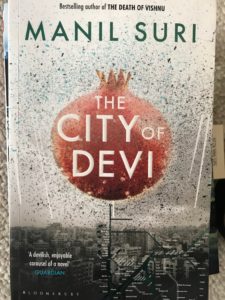 Starting with The City of Devi. Post apocalyptic Mumbai now being run by gangsters (how far is this from the truth?) and two characters thrown together by their love for the same man, in search of him among the ruins of a formerly thriving metropolis. Sarita refuses to leave Mumbai without knowing the fate of Karun, her disappeared physicist husband. In a shelter where caste, social status, and prejudices create tribal allegiances and violence, she encounters The Jazter, a brash, gay muslim who offers to help locate her husband. Their adventure and the unraveling of secret loves, fanatic Hindu nationalism (hiding behind the guise of a saint incarnate) and the art of survival (add in a Bollywood blockbuster that fuels all of the above) and you have a totaling engaging, unexpected thrilling adventure in Manil Suri’s terrific novel.
Starting with The City of Devi. Post apocalyptic Mumbai now being run by gangsters (how far is this from the truth?) and two characters thrown together by their love for the same man, in search of him among the ruins of a formerly thriving metropolis. Sarita refuses to leave Mumbai without knowing the fate of Karun, her disappeared physicist husband. In a shelter where caste, social status, and prejudices create tribal allegiances and violence, she encounters The Jazter, a brash, gay muslim who offers to help locate her husband. Their adventure and the unraveling of secret loves, fanatic Hindu nationalism (hiding behind the guise of a saint incarnate) and the art of survival (add in a Bollywood blockbuster that fuels all of the above) and you have a totaling engaging, unexpected thrilling adventure in Manil Suri’s terrific novel.
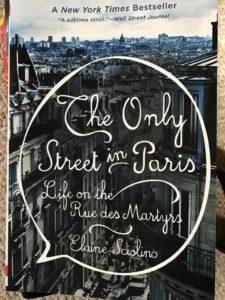 From Mumbai to Paris. It’s not that far of a stretch when you have Elaine Sciolino, veteran New York Times European correspondant and resident of Paris, telling the story. Just one street, The Only Street in Paris, according to her, is the subject of a loving portrait of not only a street and its history, but more importantly its residents. Her musings on french food and the art of purchasing the perfect baguette, eccentric Parisian habits and social graces, dêpot vente shopping (otherwise known as consignment stores), bookselling (alive and well in the City of Lights) wrapped in her reporter’s curiosity to tell the story, makes for essential reading. On a recent Paris visit I made the pilgrimage the Rue des Martyrs, namesake of the book and was hoping to catch sight of the author as I haunted the places she regaled. As an aside, Ms. Sciolino also guided me to gardens and sacred sites via articles I had guarded from NYT features from decades past.
From Mumbai to Paris. It’s not that far of a stretch when you have Elaine Sciolino, veteran New York Times European correspondant and resident of Paris, telling the story. Just one street, The Only Street in Paris, according to her, is the subject of a loving portrait of not only a street and its history, but more importantly its residents. Her musings on french food and the art of purchasing the perfect baguette, eccentric Parisian habits and social graces, dêpot vente shopping (otherwise known as consignment stores), bookselling (alive and well in the City of Lights) wrapped in her reporter’s curiosity to tell the story, makes for essential reading. On a recent Paris visit I made the pilgrimage the Rue des Martyrs, namesake of the book and was hoping to catch sight of the author as I haunted the places she regaled. As an aside, Ms. Sciolino also guided me to gardens and sacred sites via articles I had guarded from NYT features from decades past.
All The Light We Cannot See. A quote at the beginning of the book 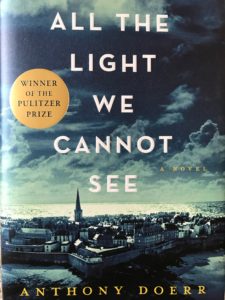 brings a chilling thought to mind if you replace “radio” with “social media.” It would not have been possible for us to take power or use it in the ways we have without the radio. (Joseph Goebbels) This Pulitzer Prize winning novel depicts the collision of two seemingly distant and unrelated teenage lives during World War II. Werner, an orphan who has talents for fixing radios is swept away with the order, security and pomp of the Third Reich. His electronic skills become an invaluable cog in the Nazi juggernaut. Meanwhile, blind Marie-Laure flees with her father when the Germans invade Paris. Unbeknownst to her, they safe guard a precious artifact from the Museum of National History where her father is keeper of the locks. (A locksmith in Paris is nothing short of magician if you have every seen the vast array of complicated keys and locking mechanisms.) Prior to D-Day, a strange radio signal is located in the citadel city of Saint Malo on Brittany’s coast, and Werner is sent to find and destroy the perpetrators. Telling the brutal story of Nazism in a subtle manner is not easy. But Doerr manages to slowly reveal how innocent citizens, through casting a blind eye, became complicit in the murderous regime and how, other citizens chose to resist. Again, during a Paris visit, the location of the Museum of Natural History (and a host of other magnificent museums) framing the Jardin des Plantes (almost a character in the first portion of the book, at least in my mind) was a telling reminder of how precious scientific knowledge is, not some twee (as in quaint) idea that may or may not hold merit.
brings a chilling thought to mind if you replace “radio” with “social media.” It would not have been possible for us to take power or use it in the ways we have without the radio. (Joseph Goebbels) This Pulitzer Prize winning novel depicts the collision of two seemingly distant and unrelated teenage lives during World War II. Werner, an orphan who has talents for fixing radios is swept away with the order, security and pomp of the Third Reich. His electronic skills become an invaluable cog in the Nazi juggernaut. Meanwhile, blind Marie-Laure flees with her father when the Germans invade Paris. Unbeknownst to her, they safe guard a precious artifact from the Museum of National History where her father is keeper of the locks. (A locksmith in Paris is nothing short of magician if you have every seen the vast array of complicated keys and locking mechanisms.) Prior to D-Day, a strange radio signal is located in the citadel city of Saint Malo on Brittany’s coast, and Werner is sent to find and destroy the perpetrators. Telling the brutal story of Nazism in a subtle manner is not easy. But Doerr manages to slowly reveal how innocent citizens, through casting a blind eye, became complicit in the murderous regime and how, other citizens chose to resist. Again, during a Paris visit, the location of the Museum of Natural History (and a host of other magnificent museums) framing the Jardin des Plantes (almost a character in the first portion of the book, at least in my mind) was a telling reminder of how precious scientific knowledge is, not some twee (as in quaint) idea that may or may not hold merit.
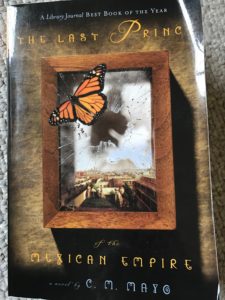 How’s your Mexican history? If it’s like mine, practically nonexistent. C.M. Mayo has written a fine historical novel that began my lacking education. The Last Prince of the Mexican Empire spans the short reign of Emperor Maximilian (yes, brother of Franz Josef and pawn of both he and Napoleon II) It’s the mid-nineteenth century, when France sent an army to colonize Mexico after the assassination of Emperor Iturbide. The surviving son flees and lives in Washington DC where he attends Georgetown and marries Alice Green. Their adventure takes them to the salons of Paris and, of course, Mexico City where Maximilian and his wife are installed (she is the ambitious daughter of Belgium’s King Leopold I.) C.M. Mayo lays out the history in vivid, accurate detail with all the political intrigue (the United States was at times too preoccupied with its own civil war and then more actively engaged when territory in its western expansion became available.) Maximilian just wanted to decorate homes and create gardens so was ill-equipped for the political exile the post symbolized (not to mention he was forced to sign an agreement relinquishing all rights to any titles of his Hapsburg heritage in exchange). Meanwhile, the surviving Iturbide son hopes to reclaim his rightful place on the throne and he and Alice agree to let their son be raised by the Maximillian household. A dreadful mistake. This is a great read and I look forward to the next in this series.
How’s your Mexican history? If it’s like mine, practically nonexistent. C.M. Mayo has written a fine historical novel that began my lacking education. The Last Prince of the Mexican Empire spans the short reign of Emperor Maximilian (yes, brother of Franz Josef and pawn of both he and Napoleon II) It’s the mid-nineteenth century, when France sent an army to colonize Mexico after the assassination of Emperor Iturbide. The surviving son flees and lives in Washington DC where he attends Georgetown and marries Alice Green. Their adventure takes them to the salons of Paris and, of course, Mexico City where Maximilian and his wife are installed (she is the ambitious daughter of Belgium’s King Leopold I.) C.M. Mayo lays out the history in vivid, accurate detail with all the political intrigue (the United States was at times too preoccupied with its own civil war and then more actively engaged when territory in its western expansion became available.) Maximilian just wanted to decorate homes and create gardens so was ill-equipped for the political exile the post symbolized (not to mention he was forced to sign an agreement relinquishing all rights to any titles of his Hapsburg heritage in exchange). Meanwhile, the surviving Iturbide son hopes to reclaim his rightful place on the throne and he and Alice agree to let their son be raised by the Maximillian household. A dreadful mistake. This is a great read and I look forward to the next in this series.
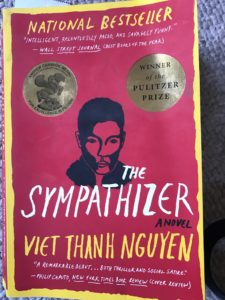 Speaking of history, how’s your Vietnamese history? Debut novelist (hard to believe) Viet Thanh Nguyen nails it in The Sympathizer (also garnering a Pulitzer Prize). “I am a spy, a sleeper, a spook, a man of two faces.” Thus opens the tale of a Viet Cong spy who is reassigned to Los Angeles after the fall of Saigon. He narrates the story with a rapier wit and keen eye for human foibles, hypocrisy (see also: politics/religion) and the lingering aftermath of a war that set the United States on its slippery slope toward fascism. He takes no prisoners. With an unerring eye on American culture and consumerism, the French, Communists, and the exiled South Vietnamese elite who find themselves washing dishes in order to survive, the reader finds herself laughing out loud and then feeling uncomfortable at the same time. I was reminded of Becky Sharp in Vanity Fair and Thackeray’s clever way of reeling in your emotions while making fun of society’s posing and power grabs, even at the most mundane level. The narrator is divided from the get-go, half-Vietnamese and half French, so his take on life begins as Janus. Spying comes naturally. More and more today we are saying “it would be hilarious if it wasn’t true…” and there is a sequence where the narrator becomes a technical consultant to a thinly veiled allusion to “Apocalypse Now.” He tries without success to point out the one dimensional Vietnamese portrayal while using Filipino actors. He attempts to insert elements of the People’s Propaganda into small moments. Absurdity and egoism prevail. Our capacity for cruelty, whilst providing reasoning for such actions is described with both glib irony and guilty remorse. Thanh Nguyen has written a novel that describes the human spirit unlike any other novel. I look forward to leading a Renesan discussion group on this novel September 21 in Santa Fe.
Speaking of history, how’s your Vietnamese history? Debut novelist (hard to believe) Viet Thanh Nguyen nails it in The Sympathizer (also garnering a Pulitzer Prize). “I am a spy, a sleeper, a spook, a man of two faces.” Thus opens the tale of a Viet Cong spy who is reassigned to Los Angeles after the fall of Saigon. He narrates the story with a rapier wit and keen eye for human foibles, hypocrisy (see also: politics/religion) and the lingering aftermath of a war that set the United States on its slippery slope toward fascism. He takes no prisoners. With an unerring eye on American culture and consumerism, the French, Communists, and the exiled South Vietnamese elite who find themselves washing dishes in order to survive, the reader finds herself laughing out loud and then feeling uncomfortable at the same time. I was reminded of Becky Sharp in Vanity Fair and Thackeray’s clever way of reeling in your emotions while making fun of society’s posing and power grabs, even at the most mundane level. The narrator is divided from the get-go, half-Vietnamese and half French, so his take on life begins as Janus. Spying comes naturally. More and more today we are saying “it would be hilarious if it wasn’t true…” and there is a sequence where the narrator becomes a technical consultant to a thinly veiled allusion to “Apocalypse Now.” He tries without success to point out the one dimensional Vietnamese portrayal while using Filipino actors. He attempts to insert elements of the People’s Propaganda into small moments. Absurdity and egoism prevail. Our capacity for cruelty, whilst providing reasoning for such actions is described with both glib irony and guilty remorse. Thanh Nguyen has written a novel that describes the human spirit unlike any other novel. I look forward to leading a Renesan discussion group on this novel September 21 in Santa Fe.
